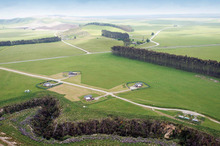Aug 10, 2014
There’ll be only yuan winner

We ain’t seen nothin’ yet. The revelation that Shanghai Pengxin is buying Lochinver Station should not be a surprise to anyone watching the capital flows out of China in the past few years.
It is only the beginning, and the scale of the flows will dwarf the $300 million-plus that Shanghai Pengxin’s property development billionaire owner Jiang Zhaobai has spent over the past three years building a portfolio of dairy and dairy-support farms in New Zealand.
Along with Lochinver’s 13,800ha, he has bought 74 per cent of Synlait Farms’ 13 farms of more than 3900ha in mid-Canterbury, and the 16 Crafar Farms’ more than 8000ha in the central North Island, including some next to Lochinver.
Collectively, they now supply 10 million kilograms of milk solids each year to Fonterra, Synlait and Miraka.
Jiang is not unusual in China. Like many savvy entrepreneurs who have made fortunes out of the boom in property development in China, he is looking for other opportunities to diversify his investments and take advantage of the biggest boom in demand for goods and services ever seen — from China’s middle classes.
New Zealanders debating their foreign ownership laws should understand the scale of the capital flows that are coming, and where they come from.
We should also understand we are not alone. Owners of luxury property, mines and farms around the world face the same opportunities and threats.
The first thing to know is that there is a wall of cash about to break out from inside China.
Over the past five years, China’s state-owned banks and a pile of property-lending finance companies lent more than US$14 trillion to developers and business owners.
That is more lending in five years than was lent by the US banking system in almost 200 years. That money is still circulating inside China and many believe it is bursting to get out, especially now property prices are starting to cool.
Chinese-owned companies and individuals have invested an estimated US$500m in land, companies, mines and farms in the rest of the world over the past five years.
At least another US$1.3 trillion is expected to be poured into property and other assets over the next decade under current capital controls, which make it very difficult to move money out of China.
This is the key point. China’s new leadership under President Xi Jingping wants to relax those capital controls to remove some of the distortions in China’s economy and impose market disciplines. This will make it easier for some of that US$14t to get out and buy assets beyond China’s borders.
China’s state-owned banks are in the vanguard of facilitating these flows. State-owned China Construction Bank, chaired in New Zealand by Jenny Shipley, was registered as a New Zealand bank this year and Industrial and Commercial Bank of China, chaired here by Don Brash, was registered as a New Zealand bank last year.
Bank of China has taken out a lease in Queen St, and is expected to also gain a licence here.
China’s banking scene was rocked last month when a state-run CCTV investigation revealed a money-laundering scheme involving Bank of China that offered help to wealthy individuals to move funds to Australia through its Significant Investor programme, similar to New Zealand’s Investor Plus programme.
The episode highlighted the scale of the funds that could flow out of China once the taps are opened. It also raises questions about the source and legitimacy of the funds.
Advocacy group Global Financial Integrity estimated that China lost US$3.8t in illicit capital outflows between 2000 and 2011.
No one is suggesting that is the case with Shanghai Pengxin, which is operating in public and in partnership with Landcorp and the Maori-owned Miraka. But banking regulators in China and New Zealand will be keeping a close eye on the source of these capital funds.
Prime Minister John Key has signalled he will revisit the issue of limits on foreign land-buying if there is a “run” of such buying. Regardless of the election result, he may not have to wait long.
Will these capital flows further pump up an overvalued currency? Are the capital flows likely to be sticky or will they be as temporary as the Japanese buy-ups of land in US in the 1980s? Can Kiwi sellers recycle the capital flowing into New Zealand into other more productive assets, as the seller of Lochinver is hoping to do?
The debate will not go away because the capital floods out of China are heading for mines, farms and other assets around the world.
By Bernard Hickey
